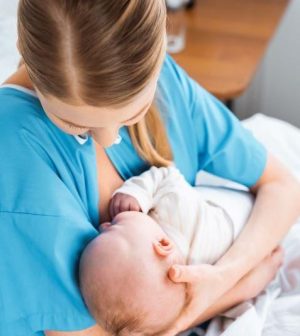- Techniques for Soothing Your Nervous System
- Does the Water in Your House Smell Funny? Here’s Why
- Can a Daily Dose of Apple Cider Vinegar Actually Aid Weight Loss?
- 6 Health Beverages That Can Actually Spike Your Blood Sugar
- Treatment Options for Social Anxiety Disorder
- Understanding the Connection Between Anxiety and Depression
- How Daily Prunes Can Influence Cholesterol and Inflammation
- When to Take B12 for Better Absorption and Energy
- Epsom Salts: Health Benefits and Uses
- See What Saffron Can Do for Sleep and Heart Health
Vaccinated Moms’ Breast Milk Could Protect Baby From COVID

Infants too young to be vaccinated for COVID-19 get some protection from their mothers’ breast milk, researchers say.
The new study follows up on findings published in 2021 that showed the breast milk of vaccinated people contained antibodies against the COVID-19 virus.
For the study, researchers analyzed infants’ stool.
“Our first study showed there were SARS-CoV-2 antibodies in the breast milk, but we couldn’t say if those antibodies were getting through the babies’ gastrointestinal tract and possibly providing protection there,” said senior study author Joseph Larkin III. He is an associate professor in the University of Florida/Institute of Food and Agricultural Sciences, in Gainesville.
Larkin and his team used a technique known as a neutralization assay to show that the antibodies found in the infants’ stool offered protection against the virus.
“The antibodies run interference and don’t let the virus get to the cells,” Larkin said in a university news release.
Even though people think of COVID-19 as a respiratory virus, it can invade the gut. Finding antibodies there is significant, the researchers said.
“The antibodies ingested through breast milk may provide a protective coating in the infants’ mouths and gastrointestinal tract,” said first author Dr. Vivian Valcarce Luaces, a postdoctoral fellowship trainee in neonatology.
Antibodies found in the blood plasma and milk of the mothers were better able to neutralize the virus, though they decreased six months after vaccination, the findings showed.
Study co-author Dr. Josef Neu, a professor of pediatrics in the University of Florida College of Medicine, said the two studies combined offer a more complete picture.
“In our research, we’re following the journey of the antibodies, from the time they are produced in mom after vaccination and now through the baby’s digestive system,” Neu said. “The next question is whether those babies are less likely to get COVID-19.”
This study included 37 mothers and 25 infants, and larger studies are needed, the researchers noted.
The U.S. Centers for Disease Control and Prevention recommends COVID-19 vaccination for people who are pregnant, breastfeeding, trying to get pregnant or who may become pregnant in the future.
About 70% of pregnant women in the United States have had a primary COVID-19 vaccine and 14% have had a bivalent booster.
Infants can’t be vaccinated against COVID-19 until they are 6 months old.
The findings were published Jan. 12 in the Journal of Perinatology.
More information
The U.S. Centers for Disease Control and Prevention has more on COVID-19 vaccination.
SOURCE: University of Florida, news release, Jan. 12, 2023
Source: HealthDay
Copyright © 2026 HealthDay. All rights reserved.










